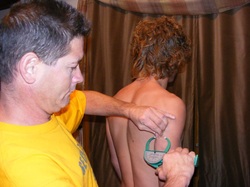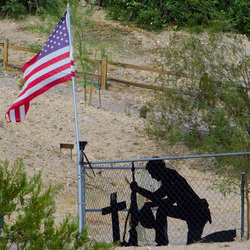
All across the country wrestlers are going through this
Today, many elite athletes do the opposite of what was intended…
They decide what weight class to compete in, weigh in at the testing site no higher than that weight (an athlete wanting to compete at 113 would weigh in no higher than 113 lbs.)…often employing unhealthy, unsafe methods to get there. They make scratch weight one time, wrestle up for most of the year, and crash down for tournament time.
How the rules in this state do the opposite of keeping athletes safe and competing at their natural weight
Encourage athletes to cut weight drastically and make weight too early
Many elite, and near-elite athletes will do the above…cut the weight in advance – so they can get to their weight class
Allow athletes to compete only once at their weight during the season
Because there is no 50% rule anymore (requiring athletes to weigh in at their chosen weight class at least half the time), athletes can make it once – usually early – then not ever have to make scratch weight again. When the state grants the growth allowance, and athletes return to that weight class, they get the extra pounds. This allows wrestlers to wrestle up most of the year and come crashing down at the end of the year when the most important events are held…sectionals, districts, and state.
Change the rules at the end of the year, encouraging massive weight cutting
During the year, athletes have to weigh in, and then wrestle 1 or 2 hours later…a rule that, in itself, discourages large weight cutting because the recovery time is short. Then, when it counts the most – at sectionals, districts and state…
they change the rules.
Allow night before weigh-ins…thereby encouraging athletes to drop as much weight as they can…and in effect, punishing those who manage their weight and wrestle close to their weight class.
Don't believe me?
I just read an article about MMA fighters. It centered on how they drop 20-30 lbs to make a weight class, then, because they have 24 hours to recover, systematically regain 15-25 lbs in that 24 hour period so they have a size advantage over their opponent.
Scary and definitely harmful to the body.
If you don't think high school wrestlers (and even younger athletes) do something similar, then you haven't been up close to see it but its out there.
Last year I went to Fargo. One athlete stands out to me…
He spent hours…and I mean probably 5 hours…working out to get back down to weight. Years ago, one of my trainees, wrestling at 103 (before the weight classes changed) ended up in the placement round at state…against a kid who weighed over 130 lbs.
We lost. Our opponent defaulted out to 6th place…but got to be a state placer by skirting the rules.
Makes you wonder if we have learned nothing from 1997.
to sum it up…
Many of our high school wrestlers in this state cut drastic amounts of weight earlier than ever before, to make scratch when they certify. During certification they go through a regimen of dehydration, followed by precisely timed hydration that allows them to pass the hydration test…then they go up during the season and come crashing down at the end of the year since they weigh in the night before for the important tournaments.
At state tournament time, they are encouraged, due to the current rules, to suck down hard and then gain as much weight as possible for the next day's matches. They can do so because of the amount of recovery time built into the system.
Does this sound healthy to you?
What reality looks like
Today, many elite athletes do the opposite of what was intended…
They decide what weight class to compete in, weigh in at the testing site no higher than that weight (an athlete wanting to compete at 113 would weigh in no higher than 113 lbs.)…often employing unhealthy, unsafe methods to get there. They make scratch weight one time, wrestle up for most of the year, and crash down for tournament time.
How the rules in this state do the opposite of keeping athletes safe and competing at their natural weight
Encourage athletes to cut weight drastically and make weight too early
Many elite, and near-elite athletes will do the above…cut the weight in advance – so they can get to their weight class
Allow athletes to compete only once at their weight during the season
Because there is no 50% rule anymore (requiring athletes to weigh in at their chosen weight class at least half the time), athletes can make it once – usually early – then not ever have to make scratch weight again. When the state grants the growth allowance, and athletes return to that weight class, they get the extra pounds. This allows wrestlers to wrestle up most of the year and come crashing down at the end of the year when the most important events are held…sectionals, districts, and state.
Change the rules at the end of the year, encouraging massive weight cutting
During the year, athletes have to weigh in, and then wrestle 1 or 2 hours later…a rule that, in itself, discourages large weight cutting because the recovery time is short. Then, when it counts the most – at sectionals, districts and state…
they change the rules.
Allow night before weigh-ins…thereby encouraging athletes to drop as much weight as they can…and in effect, punishing those who manage their weight and wrestle close to their weight class.
Don't believe me?
I just read an article about MMA fighters. It centered on how they drop 20-30 lbs to make a weight class, then, because they have 24 hours to recover, systematically regain 15-25 lbs in that 24 hour period so they have a size advantage over their opponent.
Scary and definitely harmful to the body.
If you don't think high school wrestlers (and even younger athletes) do something similar, then you haven't been up close to see it but its out there.
Last year I went to Fargo. One athlete stands out to me…
He spent hours…and I mean probably 5 hours…working out to get back down to weight. Years ago, one of my trainees, wrestling at 103 (before the weight classes changed) ended up in the placement round at state…against a kid who weighed over 130 lbs.
We lost. Our opponent defaulted out to 6th place…but got to be a state placer by skirting the rules.
Makes you wonder if we have learned nothing from 1997.
to sum it up…
Many of our high school wrestlers in this state cut drastic amounts of weight earlier than ever before, to make scratch when they certify. During certification they go through a regimen of dehydration, followed by precisely timed hydration that allows them to pass the hydration test…then they go up during the season and come crashing down at the end of the year since they weigh in the night before for the important tournaments.
At state tournament time, they are encouraged, due to the current rules, to suck down hard and then gain as much weight as possible for the next day's matches. They can do so because of the amount of recovery time built into the system.
Does this sound healthy to you?
What they should do instead
If the state, and the federation, made a couple changes, they could immediately make Ohio wrestling healthier…which should be a high priority to them.
First, require the same rules at the end of the year as the beginning. Weigh-ins for sectional, district and state should be between one and two hours, but no more than 2 hours, prior to competition. In addition, weigh-ins should take place every day of competition.
Don't tell me it can't be done, I know better. While the current system might be easier to administrate, it needs to change for the sake of the athletes, and it is doable.
Secondly, employ the 50/50 rule…or some variation of it. Regardless, athletes should be competing, or at least weighing in, at their weight class, more than twice in order to compete there at the end of the year.
Third – and I know this won't happen – either do away with alpha testing or fix it. This is a federation issue that trickles down to the state.
I don't have a solution for fixing it, but having athletes crash down to scratch weight early in the season is not healthy and needs to change. Governing bodies of wrestling will not do away with it, because it is their CYA assurance that they are keeping athletes safe…which they are not…but it keeps them legal.
But this system is flawed.
If you employed the first two rules, you wouldn't need the alpha testing at all. Athletes who couldn't compete an hour after weigh-ins, would change weight classes.
Nobody likes to lose and feel like crap in doing so.
How you can cope with alpha testing and win
Since neither the state nor the federation are interested in listening to yours truly for advice, we can't count on the above, very positive changes for our sport, happening. Therefore, you need a plan for safely working within the system to your advantage, so here goes…
- Have a body fat assessment done independently in early fall so you know what weight you can get to in a healthy manner.
- Be smarter than the state, start reducing in the fall. Instead of crashing down to your given weight class, take the 1 1/2% rule and apply it, starting in September if need be.
- Weigh in for alphas at or below scratch weight (if you are going 106, weigh 106 or below). Follow some of the smart guidelines out there regarding hydration. Get under your weight class, and a few hours before the test, drink a couple pounds of water weight so you are hydrated.
- If you work out in advance of, and the same day as the alpha test, you are likely to register a lower body fat. Keep that in mind if you are not planning on making scratch weight at alphas.
- Follow my weight management guide to stay as healthy as possible during the season while working out.
If you are not currently on the athletes email list, fill out the form below and you will immediately get the weight management guide sent to your inbox.



